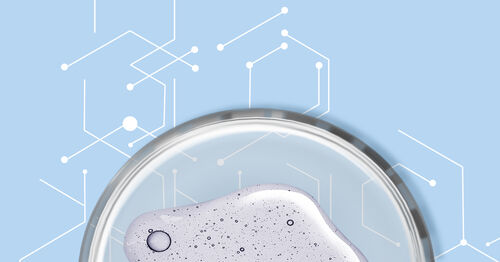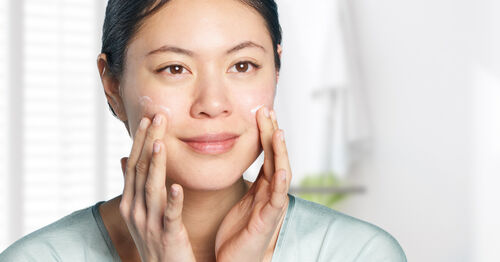
Is glycerin good for your skin? Glycerin uses, benefits & more

What is glycerin and what does glycerin do?
Glycerol, also commonly referred to as glycerin, is a natural substance produced by the body and can also be extracted from vegetable oils.[1] Glycerin is a transparent, colorless, fragrance-free substance that acts as a humectant and belongs to the skin’s natural moisturizing factors (NMFs). A humectant draws water into the skin’s stratum corneum (the outermost layer) from the air and also from within the skin. This property makes glycerin an excellent moisturizing agent, particularly in colder environments where skin dries more easily.
As well as attracting moisture, glycerin helps skin become healthier by retaining internal moisture content. This can leave skin smoother and softer. Glycerin also has the ability to easily diffuse into the surface layer of the skin, which allows it to easily exert its beneficial effects.
Due to these amazing properties, glycerin is in many skincare products.

What is glycerin used for?
Glycerin has multiple uses as it is a versatile ingredient that can be used in a wide range of products, especially in skincare and hair products. It can be used in body moisturizers and exfoliators for both oily and dry skin types.
What are the skin benefits of glycerin for skin?
Moisturizing
Through its humectant properties, glycerin is able to draw water from both the environment and the skin into the stratum corneum. This helps retain moisture in this layer of skin that is most vulnerable to drying. Glycerin is easily absorbed into the skin, which also aids its effectiveness as a moisturizing agent.
Helps strengthen the skin barrier
One of the most important functions of the skin is to act as a protective barrier. This barrier function of the skin helps prevent moisture loss from the skin into the air. It also protects the skin from environmental stressors, pollutants, and irritants.
Studies have shown that glycerin can boost the skin’s barrier function.[2, 3] Since glycerin boosts this essential function, it can also help prevent the skin from drying.
Makes skin exfoliation easier
Through glycerin’s moisturizing effect, it helps the outermost skin layer stay hydrated, which makes it easier to exfoliate – this can ultimately lead to skin feeling smooth and soft.
What Skin Types Can Use Glycerin?
Glycerin has a gentle effect on the skin, and this makes it suitable for a wide range of skin types. It is such a versatile ingredient that can be used in multiple product types.
Dry skin
Glycerin can benefit dry skin due to its humectant properties: the ability to draw in moisture from within the skin layers and from the air. It also helps the skin barrier keep moisture locked within the skin. In particular, if glycerin combines with occlusives such as dimethicone, this can tackle skin dryness synergistically.
You can find out more on the Cetaphil’s ingredient page.
Oily skin
Glycerin has a non-greasy texture, which makes it suitable for those with oily skin types. It is also non-comedogenic which means it does not clog the pores.
Combination skin
As glycerin is suitable for both dry and oily skin types, it can benefit combination skin as well.
Use our skin type guide to identify if your skin is a dry, oily or combination type.

Glycerin & Skin Sensitivity
If you have sensitive skin, this can occur from damage to the skin barrier function or because you naturally have a thinner skin barrier. This makes the skin more vulnerable to irritants, as they can penetrate the skin more easily. A thin or damaged skin barrier can also allow moisture to be lost from the skin more easily.
Since glycerin can help to boost the skin barrier, this ingredient can help sensitive skin. The humectant nature of glycerin also means it draws moisture in from the air and deeper skin, this can help tackle dryness in sensitive skin.
Visit our page on the 5 signs of skin sensitivity to learn more.
How to Use Glycerin on Your Face or for Skincare
As a cleanser:
Glycerin can often be added to skin cleansers, and in fact adding glycerin to cleansers was a significant advancement in skin cleansing. Its properties make it a star ingredient for skin cleansing and it helps to soften skin through the cleansing process. You can review our cleanser page to find a product right for you. For example, our Moisturizing Relief Body Wash contains glycerin tailored for your body’s skincare needs.
As a moisturizer:
Glycerin can be used in moisturizers for different skin types including dry, oily, and combination skin. Through its humectant properties, it draws moisture into the stratum corneum and keeps that moisture locked in by supporting the skin barrier function. This enables skin hydration to last for a prolonged time. For example, our Moisturizing Lotion contains glycerin to help provide a lasting hydration. You can find more moisturizing products on our moisturizers page.
References
- Rotondo, F. et al. (2017) "Glycerol is synthesized and secreted by adipocytes to dispose of excess glucose, via glycerogenesis and increased acyl-glycerol turnover", Scientific Reports, 7(1). doi: 10.1038/s41598-017-09450-4. [Accessed at: https://www.nature.com/articles/s41598-017-09450-4 ]
- Roussel, L., Atrux-Tallau, N. and Pirot, F. (2012) ‘Glycerol as a Skin Barrier Influencing Humectant’. Treatment of Dry Skin Syndrome, pp. 473-480. [Accessed at: https://link.springer.com/chapter/10.1007/978-3-642-27606-4_32]
- Milani, M. and Sparavigna, A. (2017) ‘The 24-hour skin hydration and barrier function effects of a hyaluronic 1%, glycerin 5%, and Centella asiatica stem cells extract moisturizing fluid: an intra-subject, randomized, assessor-blinded study’. Clinical, Cosmetic and Investigational Dermatology, 10, pp. 311-315. [Accessed at: https://www.ncbi.nlm.nih.gov/pmc/articles/PMC5560567/]













.jpg?sw=450&sh=450&sm=fit&q=85)




